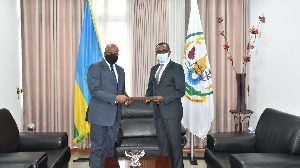 South African High Commissioner-Designate Mandisi Bongani Mabuto Mpahlwa with Rwanda's Foreign Affai
South African High Commissioner-Designate Mandisi Bongani Mabuto Mpahlwa with Rwanda's Foreign Affai
Seasoned South African politician Mandisi Mpahlwa jetted into Rwanda as ambassador-designate, in a move that is tipped to positively sway bilateral ties between the two countries.
Rwanda’s Minister for Foreign Affairs Vincent Biruta received copies of Mr Mpahlwa’s credentials.
“This was an occasion to discuss ways to further strengthen bilateral relations,” the Ministry of Foreign Affairs tweeted on its official handle.
The 60-year-old diplomat formally served as South Africa’s envoy to Mozambique and his tenure there is ending in 2020.
As a senior member of the ruling party, African National Congress, Mr Mpahlwa has previously served as Minister of Trade and as a member of parliament as well as in various government and party positions since 1999.
He will take up his post at the embassy in Kigali in January 2021.
The embassy has been vacant since December 2018, when former ambassador, George Nkosinati Twala, was summoned to Pretoria, and later permanently recalled in February 2019, following a diplomatic spat between the two countries.
At the centre of the matter was Rwanda’s disappointment with Pretoria for providing refuge to former Rwandan army chief Gen Kayumba Nyamwasa, whom Rwanda has accused of co-ordinating terror attacks on the country.
Last year Rwanda renewed an arrest warrant for Gen Kayumba, as the head of a rebel group, the P5, that is accused of conducting guerrilla attacks against Rwanda.
“The disruption of the diplomatic relations happened when South Africa received many dissidents from Rwanda. It has been reported that the dissidents have been benefiting from support in South Africa from individual businessmen in connection with rebel groups in the region around Rwanda's border,” Eric Ndushabandi, a professor of Political Science at the University of Rwanda, told The EastAfrican.
The two countries have however made moves towards normalising relations since 2018 following several talks between their two Heads of State.
South Africa enacted a new law which is part of the 1998 Refugee Amendment Act that came into effect on January 1, 2020, prohibiting refugees from participating in political activities related to their countries of origin. Rwanda welcomed the move as necessary to “curb anti-Rwanda” groups operating in the country.
South Africa has also not provided visa services to Rwandan nationals travelling on ordinary passports since 2014.
Expectations of Mr Mpahlwa’s tenure include the restoration of cordial relations between the two countries.